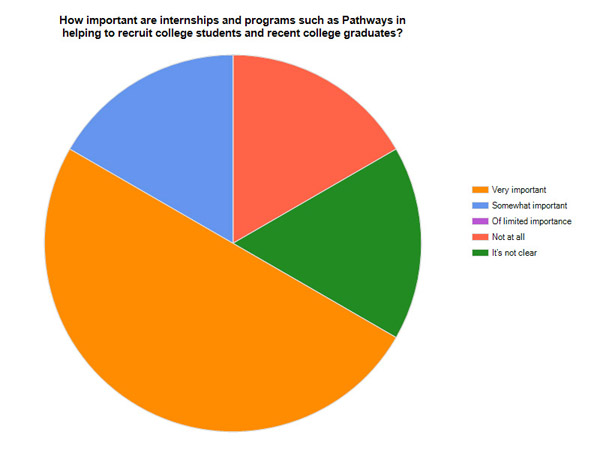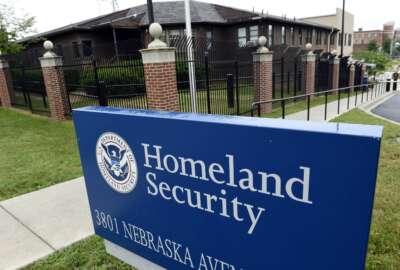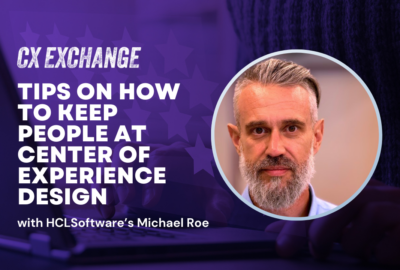Hubbard Radio Washington DC, LLC. All rights reserved. This website is not intended for users located within the European Economic Area.
Agencies, colleges share top recruiting tips in tight budget times
Tighter budgets are impacting agencies' ability to recruit new employees, according to the results of an exclusive Federal News Radio survey. But while budget d...
wfedstaff | April 17, 2015 4:06 pm
Seventy-five percent of federal chief human capital officers responding to a new Federal News Radio survey said tighter budgets have impacted their ability to recruit new employees.
Of the 12 CHCOs and deputy CHCOs who took the survey, two said budget constraints have impacted their agency’s recruiting to a “great extent,” five said the impact has been “moderate,” and two said the impact has been “limited.”
“We are no longer able to recruit new employees in a timely manner to effect a smooth transition of knowledge,” one CHCO wrote. “We use the salary lapse to fill other needs, often leaving positions vacant longer, which adversely affects those who must carry a heavier workload and reduces productivity/performance of the mission.”
That problem is only exacerbated by the growing number of federal employees choosing to retire. According to statistics from the Office of Personnel Management, 82,837 federal employees retired in 2011. That’s up from 76,864 in 2010.
Federal recruiters are looking to the nation’s colleges and universities to boost their staffs, but finding the best candidates can be a challenge. Agency recruiters and college advisers tell Federal News Radio there are certain cost-effective and innovative techniques that work better than others when it comes to recruiting the next generation of federal employees.

Tim McManus, vice president for education and outreach at the Partnership for Public Service, said the government needs to place a priority on reaching out to college students and recent graduates to fill its vacant positions.
“The federal workforce is older than the workforce at large,” he said. “That’s reason number one to bring those folks in.”
According to the Congressional Budget Office, the average age of a federal employee is 45 compared with 41 in the private sector.
A younger generation of recruits also brings innovation, creativity and new ways of thinking to the federal process, McManus said.
“Clearly, our government has a lot of challenges,” McManus said. “We have to bring in differing views.”
Establishing a two-way relationship
Although many students and recent graduates may be interested in working for the federal government, the path to the civil service can still be daunting, according to college advisers who spoke with Federal News Radio.
They say it’s important for recruiters to foster a two-way relationship with a school’s advising staff to help ease students into the federal workforce.
Asked how closely their organizations worked with colleges and universities to recruit new employees, seven of the 12 CHCOs surveyed said the organizations did so to “a great extent.” One said “a moderate extent” and four said to “a limited extent.”
Jennifer Carignan, a career adviser for American University’s School of Public Affairs, said members of American’s career advising staff want to work with federal recruiters any way they can, whether through on-campus events or posting job and internship opportunities for students to see. 
At American, job fairs and similar events that offer one-on-one interactions with federal employees can be among the most valuable opportunities for students seeking a career in the federal service, Carignan said.
“Oftentimes that personal touch of actually being able to talk to a person and ask about what they do on a daily basis and what the culture of their organization is like, it’s those interactions that oftentimes make a big difference in whether a student actually applies for a position,” she said.
Christine Cruzvergara, associate director for employer relations and career development at George Mason University in Fairfax, Va., said her school was interested in linking up with federal recruiters.
“Honestly, we’d love to develop some of those relationships,” she said. “We’d love to develop some new relationships with some other agencies that are also highly sought after by our students like the NIH, even stronger relationships with the State Department, for example, DoD, things like that.”
Every fall, Georgetown University hosts Government Week, which offers a concentrated group of programs focused on pursuing a federal career.
“Having an employer partner with us and offering a workshop on how to write a federal resume or doing a panel where they bring in an alum to talk about ‘This is what I did when I was an undergraduate here. This is what I’m doing now,'” said Tara Duprey, assistant director of external relations at Georgetown’s Cawley Career Education Center. “Those kinds of touchpoints are really powerful and more and more employers are beginning to see beyond only the information session, rather making it a multi-pronged approach when they’re doing an information session.”
Agencies that engage with students on campus facilitate the employment process, said Sara Fishering, the education coordinator at the University of Maryland’s National Consortium for the Study of Terrorism and Responses to Terrorism (START).
“I know that the [National Security Agency] is reaching out on the University of Maryland campus more and more and that’s great,” she said. “That means, as a staff member, I can talk to their recruiters and HR people directly and ask them ‘How can I help my students stand out when you’re looking at all of these hundreds of applications?'”
Government and colleges working together
START is a DHS Center of Excellence that conducts research on the causes of terrorism, focusing on the behavioral and social sciences. Its headquarters is based at UMD, but it has offices all over the country and internationally. The UMD program offers a minor in global terrorism studies and an online graduate certificate in terrorism analysis.

“We also have a career development program, which is funded by a grant from the Department of Homeland Security,” Fishering said. “This year, we have students with a language focus. In the past, we have done programs that are more simply based in undergraduate terrorism analysis training. We also have a huge internship program where we have between 40 and 60 undergraduate and master degree level students working directly with us on our research projects here at the University of Maryland.”
During the summer, the internship program has students working all over the country and, during the fall and spring, the students tend to be from the Washington area. “They work with our researchers in teams on the projects that the researchers are conducting,” Fishering said. “We have students working on the Global Terrorism Database, which is one of our larger products.”
At UMD, START recently hosted a panel of experts from private organizations and the public sector to talk to students about where they thought the Homeland Security industry was headed.
“We had a networking event right afterwards where students had the opportunity to follow up and have more kind of in-depth conversations with the panelists,” said Fishering.
“They don’t just leave here with skills they learn in the internship program, they leave here with a bigger network, with other transferable skills,” Fishering said. “We go over their resumes, things like that, so that when they transfer into the workforce they have a smoother transition.”
Reaching students where they live
Some agencies are going even further in how they recruit on campuses. The Department of Defense employs a multifaceted approach to hiring new recruits for its civilian staff, including a mix of brick-and-mortar strategies and social media.
Through its Student Training and Academic Recruitment (STAR) program, DoD hires students part-time to help them recruit their peers on campus.
“We found that peer-to-peer recruiting is very successful in letting students know there are civilian career opportunities at the Department of Defense,” said Carin Otero, chief of strategic recruitment programs at the Defense Civilian Personnel Advisory Service (DCPAS).
STAR students put in about 20 hours a week for DoD while going to school full-time. “We typically hire them when they’re a rising junior and they’re getting into thinking about their career field,” Otero said. “It is our hope that they’ll consider a career with the Department of Defense when they graduate.”
DoD currently partners with five universities on the STAR program: Michigan Technological University; the University of Puerto Rico at Mayaguez; Tennessee State University; the Rochester Institute of Technology’s National Technical Institute for the Deaf and the University of Maryland’s Baltimore campus.
While budgets may be tight, Sheila Reid Dent, the technical director for HR operations and advisory services at DCPAS, said her agency is still hiring.
“Even in a year that we’re not hiring new bodies, we still had our attrition hiring,” Dent said. “Last year, we still hired 80,000 new-hire civilians at DoD and the year before it was 100,000. So, we still have a significant level of hiring going on even with reduced budgets and projected further reductions.”
While DoD branched out into virtual career fairs to recruit new employees, many college students are telling recruiters they prefer the old way of doing things.
“They like meeting recruiters, looking them in the eyes and having some dialogue with a real person,” Dent said. “It validates that having multiple modes of recruiting are really important, and that is the future of identifying our future workforce.”
In addition to social media and career fairs, DoD recruiters reach out via their website, GoDefense.com and toll-free number 1-888-DOD-4USA.
“We don’t think there’s one successful way to recruit, but we want to employ as many diverse and exciting strategies that we can to attract candidates,” Dent said.
Pathways to the civil service
In July, the Office of Personnel Management implemented its new Pathways Programs as a way to streamline the hiring of college students and recent graduates. The initiative is made up of three elements: an internship program, a recent graduate program and the Presidential Management Fellows Program.
The system was established after OPM found that students were struggling to compete in a system that was very experience-based.
 |
| Twelve chief human capital officers responded to a recent Federal News Radio survey about how important internship programs are to recruiting. [Click on chart to enlarge.] |
“We didn’t want to lose sight of the fact that with education and a great dose of potential, we would have some excellent employees that we could bring on board,” Angela Bailey, OPM’s associate director of employee services, said.
Federal News Radio asked CHCOs about the importance of internships and programs such as Pathways in helping to recruit college students and recent college grads. Half of those surveyed said those types of programs were “very important,” while the other half was equally divided between “somewhat important,” “not at all” important and “it’s not clear.”
“Since the program just began, we do not have much data on its impact on recruitment to this point,” one CHCO commented in the survey. “The old program was important for the recruiting of college students.”
Selling a career in public service
Ultimately, whether through campus visits, internships, social media or interviews, the federal recruiter must impart to potential new hires the advantages of choosing a job in the civil service over on in the private sector.
“One is upward mobility,” Cruzvergara said. “A lot about the federal government is structured in a way that really encourages advancement, professional development, growth of skills and new responsibilities, so that’s a huge benefit to going into the federal government is just how structured and organized they are for that upward mobility and trajectory.”

In addition, many of the jobs in the federal government are “ladder positions,” in which employees know when they’re hired within a few years they’ll be able to move up a couple of rungs on the job ladder. “Within a five-year period, you may have increased your responsibilities and salary quite significantly,” Cruzvergara said.
“There’s also a lot of stability in the federal government,” Cruzvergara said. “And the benefits are absolutely phenomenal in terms of retirement, in terms of health care benefits, … when you talk about work-life balance and flexibility. Teleworking has become a big thing for the federal government and with the new millennial generation that’s graduating and going into the workforce, that’s something a lot of them have said is very important to them is that balance and work-life flexibility, and that is something that the civil service really does provide.”
Another appealing factor for many graduates is the federal service’s “larger mission,” Cruzvergara said.
“To know that you’re part of that bigger mission and that you’re serving the country and giving back in a bigger way is also a benefit of the civil service,” she said.
(More results of Federal News Radio’s exclusive survey with chief human capital officers will be released later this month.)
RELATED STORIES:
DHS surfing the retirement wave, turns focus to leadership, morale
Pathways offers departments access to fresh talent
OPM finalizes rules for new intern, hiring programs
Copyright © 2024 Federal News Network. All rights reserved. This website is not intended for users located within the European Economic Area.
Michael O'Connell
Michael O’Connell is senior digital editor of Federal News Network optimizing content for the best user experience. Follow @moconnellWFED
Follow @moconnellWFED
CX Exchange 2024: HCLSoftware’s Michael Roe on keeping people at center of experience design
Related Topics
All News
American University
Defense
Defense Department
Department of Homeland Security
exclusive
George Mason University
Georgetown University
Hiring/Retention
Office of Personnel Management
Partnership for Public Service
Pathways Program
Radio Interviews
recruitment
Tim McManus
University of Maryland
Workforce





